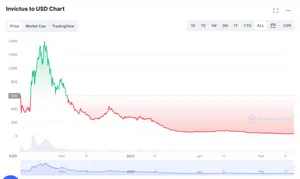Fortunately there doesn't actually appear to be much to the project yet — actually creating a platform and an app to allow people to borrow books doesn't come until the fifth and sixth stages of their roadmap. The project is currently on the fourth step, and has been focusing their attentions on things like "marketing campaign" (stage 1), "aggressive marketing rollout" (stage 2), and "extreme marketing campaign" (stage 3). The stage 3 "extreme marketing campaign" also came with a "website relaunch", which we have to thank for one of the most outrageous pie charts I have ever seen (pictured) (which was later determined to have been a stock photo of a pie chart where they'd just changed the numbers). Perhaps they should focus some of their marketing efforts on coming up with answers to the simplest of questions that they should probably expect from authors — the type of people they're claiming to help.
NFTBOOKS enters the race to see who can remake DRM the worst
Hundred Finance and Agave Finance are both exploited for a collective $12 million
Hundred and Agave were the second and third defi protocols targeted by flash loan attacks that same day, with Deus Finance losing more than $3 million to hackers using the same class of exploit.
Binance pauses withdrawals and deposits via Polygon
Hackers make off with over $3 million from Deus Finance
Sneaky malware replaces Bitcoin addresses in clipboard to reroute transactions
Invictus DAO whales quickly vote to shutter the project in its first ever community vote, leaving most others with huge losses
However, although the project enjoyed a spike in price in November, the token has bled value since then. On March 9, the project leaders began a conversation about team salaries, where they also floated the idea of redeeming the treasury and closing the project. On March 11 they began a vote, which lasted only three days, and allowed members of the DAO to vote on whether the project should close and distribute treasury funds to participants. Much like the Wonderland vote in late January, a relatively small number of whales with a large share of the votes (who bought in early and still stood to make money on the project) were able to pass the vote to close the project, despite a majority of voters selecting to keep the project going. Furthermore, because the Invictus tokens used for voting also themselves hold the value, some people were unable to vote in the poll because their tokens were locked up in lending platforms where they had used them as collateral. Many participants in the project who haven't been actively watching the governance page likely don't even know the vote happened.
Some members of the project wrote on Discord that they felt rugged, with one even speculating that the project had been so eager to implement voting so they could pass a "community" vote to close the project and make off with a profit without damaging their reputations or potentially facing lawsuits. Various members of the project Discord shared how much they had lost: one person said they were down $20,000, another was down $75,000, and a third person reported losing $400,000. One person asked "who else is in the 6 figure loss club" and received three agreement emoji reactions; another person said they'd lost a year's salary. Some people already opted to try to sell their tokens early, worrying that the project leaders might make off with the treasury and not allow people to redeem their $IN; others waited in hopes of the redemption price being higher than the current token price; and some even suggested buying more $IN in hopes that they could make a profit if the redemption price is higher than the current price.
- [RFC] Allocate Funds for Team / Operational Expenses + Third Option on Invictus DAO forums
- [INIP] Allocate Funds for Team / Operational Expenses + Redemption on Invictus DAO forums
Discord compromise targets fans of the Wizard Pass project in a two-for-one scam that both accepted payments for fake NFTs and stole the NFTs that victims already owned
A Twitter thread by SerpentAU suggested that the malicious minting website had not only accepted ETH from victims and provided nothing in return, but had also prompted users to grant full access to their NFT wallet, allowing valuable NFTs to be stolen. It's not yet clear how many NFTs were stolen as a result.









